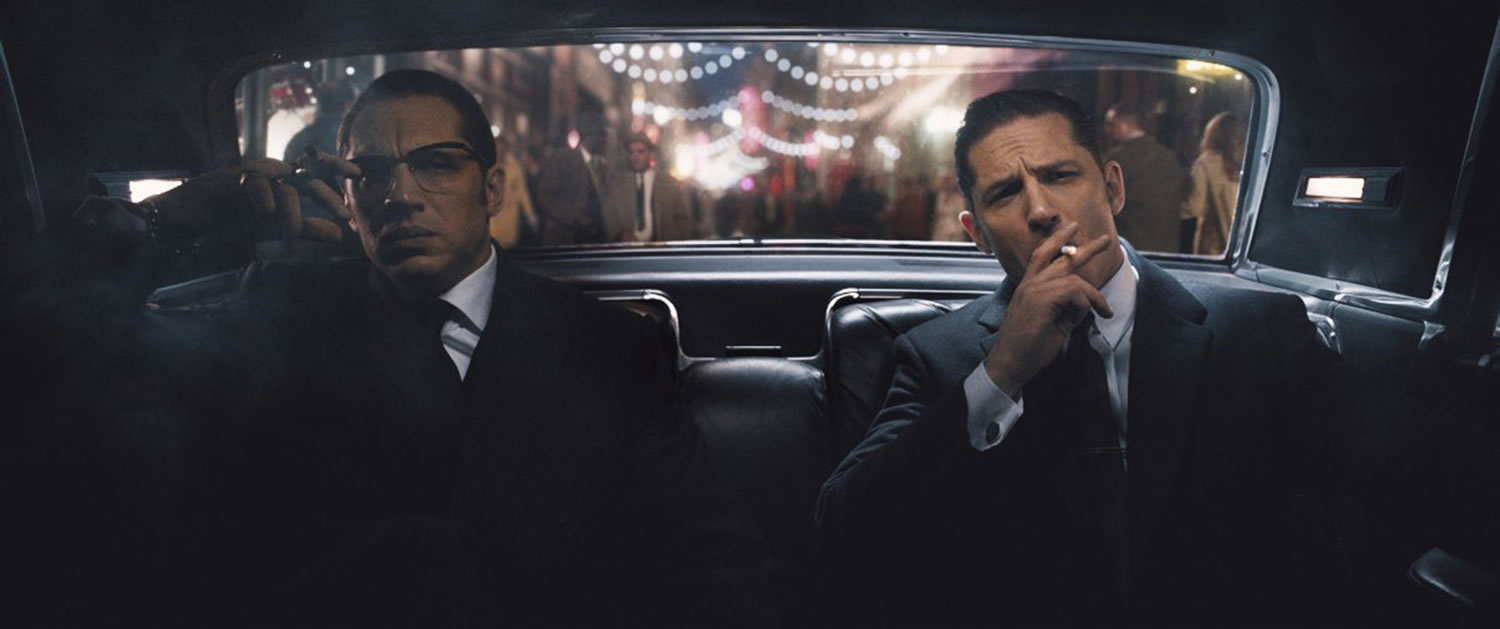Tales of crime and gangsterdom have long been tinged with a seedy glamour, a mix of grit and polish. The story of Ronald and Reggie Kray, twin brothers who were kingpins of the London underworld at the height of the Swinging ’60s, adds a bit of psychodrama and is already the stuff of legend, with numerous books and movies based on their exploits.
“Legend” is directed by Brian Helgeland, who also adapted the screenplay from John Pearson’s book “The Profession of Violence,” and the movie attempts to tell the story of the Krays from the vantage point of Frances Shea, a local girl who would marry Reggie. This creates overlapping intersections of loyalty and affection between the brothers, their business and Frances. Helgeland, who wrote and directed the Jackie Robinson biopic “42” and isa co-Oscar winner for the screenplay to “L.A. Confidential,” here never fully connects the personal side of the Krays to their criminal myth.
“Legend” is first and foremost a launching pad for a wild dual-character performance by Tom Hardy as both Reg and Ron. As identical twins, he genuinely seems like two different people, so completely does Hardy transform himself in creating a distinct physicality for each brother. There is a mad, creative energy to his performance that is sorely lacking everywhere else in the movie.
Reg is dashing and the more fully functioning of the two, adding a touch of movie-star charm as he climbs to Frances’ window with flowers and sweets. Ron, who would be diagnosed a paranoid schizophrenic, is more lumbering and volatile, though given to moments of uneasy lightness as when he dances clumsily at a Christmas party that ends violently.
In the relatively thankless task of playing Frances is Australian actress Emily Browning. Her small-framed physique makes for an intriguing visual counter-balance as Hardy essentially engulfs her wherever they are standing near, but the story never finds much for her to do besides be wooed and then wait around.
In playing both brothers Hardy manifests the tension that has been playing itself out in his own career, as the actor seems driven to deny the handsome-leading-man parts that beckon him and instead prefers anything he can use to dirty and disguise himself. He seemed uneasy in the Reese Witherspoon rom-com espionage vehicle “This Means War,” his most conventional role, and even in taking on the franchise title role of “Mad Max: Fury Road” this year he spent a long part of the movie with a mask strapped to his face.
His own flamboyance as a performer and restlessness with his own magnetism was better played out in the 2007 Nicolas Winding Refn film “Bronson,” also a story of a notorious British crime figure.
An opening voice-over by Frances — she narrates throughout — announces the era as the 1960s, and no real sense of passing time is given after that. The distinctions between London in 1962, 1965 and 1968 are presumably notable, as fashions and cultural attitudes changed rapidly as what we popularly think of as the ’60s took hold.
But you’d never much know it from “Legend,” and if the idea is that the world of the Krays was some kind of bubble impervious to outside influence, some fuller indication is needed. (That the music in the film includes numerous songs such as Billy Preston’s “Slaughter” that actually came out well after the story concludes also makes for confusion.) Donald Cammell and Nicolas Roeg’s 1970 film “Performance,” itself said to be influenced by the Krays in its story of a gangster who hides out in the mansion of a rock star, tapped into the animating cultural currents of the era with a specificity sorely lacking here.
The intense bond between the brothers makes it difficult for someone else to wedge their way in, perhaps dooming Reg and Frances’ relationship from the start. In mapping their unusual triangle, the mechanics of the Krays’ underworld business, a turf war with another British gang and dealings with the American mob to launder bearer bonds and establish a foothold in the world of U.K. casinos, comes to feel tacked on and in the way. Perhaps Helgeland thought he could keep more balls in the air than he can ultimately juggle.
The story follows a fairly conventional rise-and-fall arc, so when it winds up in hubris, death and prison, it seems more dutiful than tragic. The decision as well to shoot a scene in which Reg first whisks Frances into one of his nightclubs in a long Steadicam shot also feels overly familiar. The film’s excursions into violence feel oddly noncommittal, even as a centerpiece fight between Reg and Ron makes for a nifty bit of camera trickery.
The Krays themselves cultivated the myths that sprouted around them, in a manner not entirely dissimilar from onetime Boston crime-boss James “Whitey” Bulger, subject of the recent movie “Black Mass.” But as told by Helgeland this “Legend” simply isn’t memorable, because a tremendous effort by Hardy is let down by unfocused storytelling.



